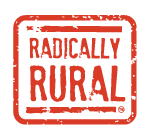This current time of crisis and virus has created a signature moment in history for the local news industry. Journalists are covering unchartered political, economic and societal waters, and, more than ever, trusted, accurate information is needed in local communities, a growing number of which no longer have local news organizations serving them. Financial challenges, particularly for newspapers, have placed many in jeopardy.
On Sept. 24, at Radically Rural – Remote, the event’s Community Journalism Track, will address tactics for remaining resilient in journalism in a period marked by turbulence and fast change, says Terrence L. Williams, president and publisher of The Keene Sentinel, and organizer of the journalism track.
“The need for communities to be informed has never been greater,” Williams said. “But how can we guarantee that against market forces that are resulting in lost journalism jobs and even publications? We’ve focused the Summit this year on the ways and means that can help with that goal.”
Radically Rural – Remote, a partnership between the Keene Sentinel and that Hannah Grimes Center for Entrepreneurship, is being held online this, it’s third year, on Sept. 24, starting at 8 a.m. with a keynote speaker. Track sessions are staged at 9 a.m., 11 a.m. and 2 p.m. with a closing speaker at 4 p.m. An interactive idea jam is planned between 1 p.m. and 2 p.m. on a video conference platform.
Radically Rural features tracks in community journalism, arts and culture, lands and community, main streets and downtowns, clean energy and entrepreneurship.
The journalism track includes:
What’s at Stake: An introduction to the power of the “Table Stakes” approach to editorial content and subscription revenue at small news operations – 9 a.m.
This first journalism session will include an expert panel led by Amy Kovac-Ashley, vice president and senior director at the American Press Institute. Panelists include Autumn Phillips, managing editor, Post & Courier of Charleston, S.C.; Liz White, publisher, The Record-Journal, Meriden, CT; and Les High, publisher, The News Reporter, Columbus County, N.C. They will discuss the Table Stakes model for analyzing readership data in order to deliver stories that build readership. The session will get at the question of how community news organizations can increase paid readership and retain existing customers.
New Models for Success: Innovative approaches to community news publications – 11 a.m.
Moderator Kristen Hare, a reporter at the Poynter Institute, leads a panel discussion on new types of publications and new approaches to news across the country. These include non-profits, digital-only publications and legacy operations that have pivoted successfully during economic challenges.
She is joined by panelists Tamika Moore, managing producer at Red Clay Media, Birmingham, Ala.; Larry Rykman, co-founder of The Colorado Sun; Les Zaitz, editor and publisher of Oregon’s Malheur Enterprise; and Jim Iovino, visiting assistant professor of media innovation at West Virginia University.
Crazy Good: 50 ideas to build revenue and readership – 2 p.m.
It’s back! A fast-paced romp through best practices to boost revenue and audience at news organizations. Linda Conway, executive director for the New England Newspaper and Press Association, and Williams will lead attendees through 50 ideas to build readership and revenue. These concepts, pulled from rural news organizations across the country, can be “dragged and dropped” into existing and start-up news organizations and will be presented in a fun and lively way.
For more information on the Radically Rural – Remote summit and to purchase tickets, please visit the event’s website at radicallyrural.org
